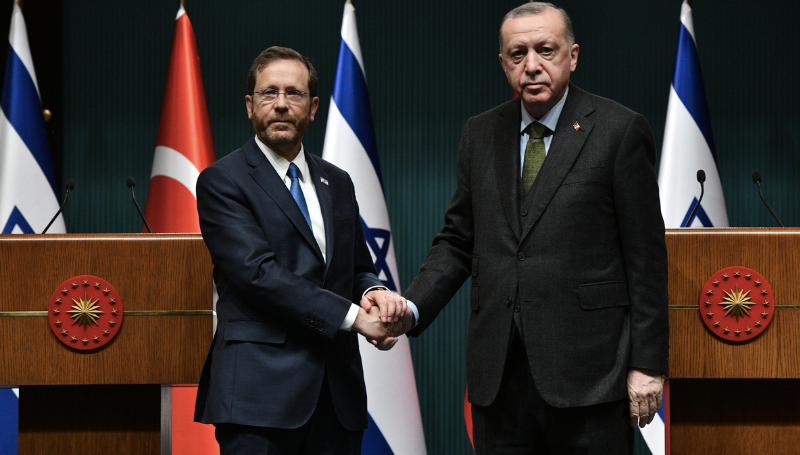Hay Eytan Cohen Yanarocak
Mosaic, June 7, 2022
“This is the real difference between now and 2016: for the first time in the two countries’ histories, the Jewish state has the upper hand. Turkey is no longer in a position to dictate terms, and it is no longer Israel that must accept whatever it can get.”
In March 9, the Israeli president Isaac Herzog arrived in Ankara for an official visit, which included a meeting with the Turkish president Recep Tayyip Erdoğan. Herzog had told the Israeli press before his departure that his purpose was to “reset” relations with Turkey—which, since the beginning of the century, have gone from friendly to overtly contentious. Just two weeks ago, the Turkish foreign minister Mevlüt Çavuşoğlu traveled to the Jewish state, the first such visit in fifteen years. There have been several signs that, unlike previous attempts to mend fences, the latest might succeed.
The case in favor of reconciliation between Israel and Turkey is a strong one, and not only because of the long history of close diplomatic and military ties. Both nations share a common ally in Azerbaijan; both border Syria, and would prefer not to see the Russia-Iran-Assad axis succeed there. As a NATO member, Ankara is at least nominally aligned with the U.S., Israel’s greatest ally. If Turkey and Israel—which possess the two most capable militaries in the Middle East—could set aside their differences, they would together be a powerful pro-Western force in the region. Erdoğan, moreover, is diplomatically isolated and faced with an economic crisis, and thus could use all the help he could get.
Nonetheless, there are numerous factors militating against reconciliation. President Erdoğan is vocally pro-Palestinian and anti-Israel. He openly supports Hamas, allowing it to use Turkey as its base of operations—a policy that has led to unrest in the Arab-majority areas of Jerusalem, where Turkey has spent millions to develop an influence network. At the same time, the Jewish state in recent years has forged increasingly close ties with Cyprus and Greece, Turkey’s sworn enemies. Erdoğan also seems an unreliable ally against Iran: even as he supports anti-Iranian forces in Syria and the Caucasus, he allows sanctions-evading trade to flow through Turkish territory and banks. When it comes to Russia, too, Ankara has played both sides, having purchased sophisticated Russian missiles against the wishes of its NATO allies, but now selling drones to Ukraine that have proved crucial in the current war.
To view the original article, click here


